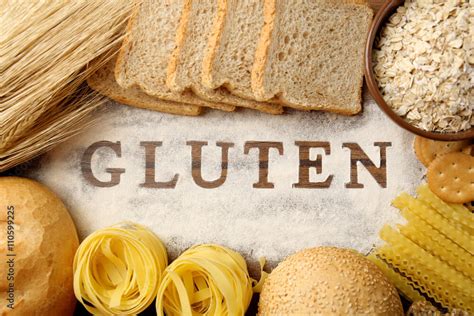Intro
Discover the benefits of a gluten free diet for celiac disease management, exploring gluten intolerance symptoms, celiac disease treatment, and wheat free recipes for a healthy lifestyle.
The importance of a gluten-free diet has become increasingly recognized in recent years, particularly for individuals with celiac disease, an autoimmune disorder that causes the immune system to react to gluten. Gluten is a protein found in wheat, barley, and rye, and for those with celiac disease, consuming gluten can lead to damage in the small intestine and malabsorption of essential nutrients. In addition to celiac disease, some individuals may experience non-celiac gluten sensitivity, which can cause similar symptoms, although the exact mechanisms are not yet fully understood. As research continues to uncover the complexities of gluten-related disorders, the adoption of a gluten-free diet has become a crucial aspect of managing these conditions.
The impact of gluten on individuals with celiac disease or non-celiac gluten sensitivity can be severe, with symptoms ranging from mild to debilitating. These symptoms may include abdominal pain, diarrhea, fatigue, and weight loss, among others. Furthermore, if left untreated, celiac disease can lead to complications such as osteoporosis, anemia, and increased risk of other autoimmune diseases. The only currently recognized treatment for celiac disease and, in many cases, for non-celiac gluten sensitivity, is strict adherence to a gluten-free diet. This dietary approach not only alleviates symptoms but also helps in healing and preventing further damage to the small intestine.
Understanding the necessity of a gluten-free diet for those affected by gluten-related disorders is crucial. It involves more than just avoiding foods that contain gluten; it requires a comprehensive approach to nutrition, ensuring that the diet remains balanced and nutrient-rich. This can be challenging, given that many common foods, such as bread, pasta, and baked goods, contain gluten. However, with the increasing awareness and availability of gluten-free products, following a gluten-free diet has become more manageable than ever. Moreover, adopting such a diet can also encourage healthier eating habits, focusing on whole, unprocessed foods like fruits, vegetables, lean proteins, and whole grains that are naturally gluten-free.
Introduction to Gluten-Free Diet

A gluten-free diet is designed to exclude gluten, a protein found in certain grains, specifically wheat, barley, and rye. This dietary approach is essential for managing celiac disease and can also benefit individuals with non-celiac gluten sensitivity. The diet involves careful selection of foods to avoid any that contain gluten, while ensuring the intake of a balanced mix of nutrients. Gluten-free diets have become more accessible due to the growing market of gluten-free products, which include alternatives to traditional bread, pasta, and baked goods, as well as a wide range of naturally gluten-free foods.
Benefits of a Gluten-Free Diet
The benefits of a gluten-free diet for individuals with gluten-related disorders are multifaceted: - **Symptom Relief:** Perhaps the most immediate benefit is the alleviation of symptoms associated with celiac disease and non-celiac gluten sensitivity, such as abdominal pain, diarrhea, and fatigue. - **Intestinal Healing:** For those with celiac disease, a gluten-free diet allows the small intestine to heal, reducing the risk of complications like malnutrition and osteoporosis. - **Reduced Risk of Complications:** By managing the condition through diet, individuals can reduce their risk of developing other autoimmune diseases and conditions associated with celiac disease. - **Improved Nutritional Status:** With careful planning, a gluten-free diet can ensure that individuals receive all the necessary nutrients for optimal health, potentially improving overall well-being.Understanding Gluten and Gluten-Related Disorders

Gluten is a complex protein found in wheat, barley, and rye, which gives dough its elasticity and chewiness. While gluten is beneficial for baking and culinary purposes, it poses a significant health risk for individuals with celiac disease and those with non-celiac gluten sensitivity. Celiac disease is characterized by an immune response to gluten, leading to inflammation and damage in the small intestine. This damage impairs the ability of the small intestine to absorb nutrients, potentially leading to malnutrition and a range of health issues. Non-celiac gluten sensitivity, on the other hand, involves symptoms similar to celiac disease but without the same level of intestinal damage, and the exact mechanisms are still under research.
Diagnosis of Gluten-Related Disorders
Diagnosing gluten-related disorders can be complex and involves a combination of medical history, physical examination, blood tests, and intestinal biopsy. For celiac disease, blood tests are used to detect certain antibodies, and an intestinal biopsy can show damage to the villi of the small intestine. For non-celiac gluten sensitivity, diagnosis is often based on the exclusion of other conditions and the improvement of symptoms on a gluten-free diet. It's crucial for individuals to work closely with healthcare providers to accurately diagnose and manage these conditions.Implementing a Gluten-Free Diet

Implementing a gluten-free diet requires careful planning and attention to detail. Here are some steps and tips to help individuals transition to a gluten-free lifestyle:
- Read Labels: Become an expert at reading food labels, looking for the "gluten-free" certification or checking the ingredient list for sources of gluten.
- Focus on Whole Foods: Emphasize whole, unprocessed foods like fruits, vegetables, lean proteins, and gluten-free whole grains, which are naturally free from gluten.
- Explore Gluten-Free Products: Utilize the wide range of gluten-free products available, from bread and pasta to cereals and snacks, to make the diet more manageable and enjoyable.
- Be Mindful of Cross-Contamination: For those with celiac disease, it's crucial to avoid cross-contamination with gluten in the kitchen and when eating out, to prevent accidental exposure.
Common Gluten-Free Foods
Some common foods that are naturally gluten-free include: - Fresh fruits and vegetables - Meat, poultry, and seafood - Rice and corn - Quinoa and other gluten-free grains - Beans, lentils, and peas - Nuts and seeds - Dairy products (ensure they are gluten-free)Challenges and Considerations

While a gluten-free diet can be highly beneficial for those with gluten-related disorders, there are challenges and considerations to be aware of:
- Nutritional Balance: Ensuring the diet is well-balanced and includes all necessary nutrients can be challenging, especially if individuals rely heavily on processed gluten-free products.
- Social and Emotional Impact: Adhering to a gluten-free diet can have social and emotional implications, such as feeling isolated during meals or needing to ask questions when eating out.
- Cost: Gluten-free products can be more expensive than their gluten-containing counterparts, potentially increasing the cost of groceries.
Managing Social Situations
Managing social situations on a gluten-free diet requires communication and planning: - **Inform Your Hosts:** When attending social gatherings or dining at someone's home, inform your hosts about your dietary needs to ensure they can accommodate you. - **Ask Questions:** When eating out, don't hesitate to ask your server about gluten-free options and how food is prepared to avoid cross-contamination. - **Bring Your Own Food:** If necessary, consider bringing your own gluten-free food to ensure you have something safe to eat.Future Perspectives and Research

Research into gluten-related disorders is ongoing, with scientists exploring new avenues for treatment and management. Potential future developments include:
- Pharmaceutical Interventions: Researchers are working on pharmaceutical treatments that could potentially allow individuals with celiac disease to consume gluten without adverse effects.
- Gene Therapy: There is interest in gene therapy as a possible future treatment for celiac disease, although this is still in the early stages of research.
- Improved Diagnostic Tools: Efforts are being made to develop more accurate and less invasive diagnostic tests for celiac disease and non-celiac gluten sensitivity.
Conclusion and Next Steps
In conclusion, a gluten-free diet is a vital management strategy for individuals with celiac disease and those with non-celiac gluten sensitivity. By understanding the importance of this dietary approach, the benefits it offers, and how to implement it effectively, individuals can better manage their conditions and improve their quality of life. As research continues to advance our understanding of gluten-related disorders, it is essential for individuals to stay informed and work closely with healthcare providers to ensure they are receiving the best possible care.What is celiac disease?
+Celiac disease is an autoimmune disorder that causes the immune system to react to gluten, leading to damage in the small intestine and malabsorption of nutrients.
What are the symptoms of non-celiac gluten sensitivity?
+Symptoms can include abdominal pain, diarrhea, fatigue, and weight loss, similar to celiac disease but without the intestinal damage.
How do I start a gluten-free diet?
+Start by reading food labels, focusing on whole, unprocessed foods, and exploring gluten-free products. It's also crucial to consult with a healthcare provider or a dietitian for personalized guidance.
We invite you to share your experiences and questions about adopting a gluten-free diet in the comments below. Your insights can help others who are navigating similar challenges and opportunities for healthier living. Additionally, consider sharing this article with friends and family who might benefit from understanding more about gluten-related disorders and the importance of a gluten-free diet. Together, we can support each other in our journeys towards better health and well-being.
